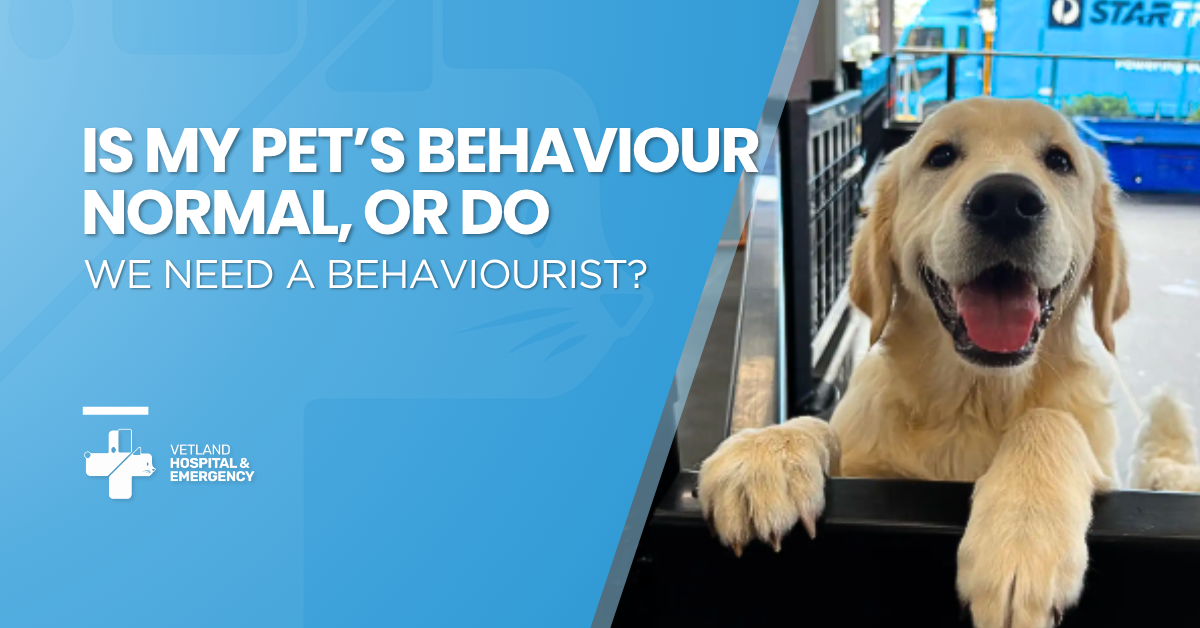Dr Vicky’s Best Cat Dental Care Tips That Can Change Your Cat’s Life
Your cat may be hiding dental pain right now, would you know it? Cat dental care matters for one reason—it hurts.There are no obvious symptoms, but...
2 min read
![]() VetLand Hospital & Emergency
Jun 13, 2025 8:28:33 PM
VetLand Hospital & Emergency
Jun 13, 2025 8:28:33 PM

It’s a question many pet families quietly ask themselves—is this just normal? When their dog growls at visitors, their cat hides for days, or daily walks feel more like a battle than a bond.
The truth is, behavioural issues are common, and they’re nothing to be ashamed of. If anything, they're on the rise!
Many behaviours we label as “bad” are actually your pet’s way of coping with frustration, uncertainty, or even anxiety.
It’s completely okay not to know whether your pet’s behaviour is normal—many signs of stress or anxiety can be subtle or easily misunderstood. That’s where a trusted professional can help.
You don’t need all the answers or perfect video footage. A clear description of what you’re seeing is often more than enough for most behaviour professionals to guide you in the right direction. Reaching out early can make a big difference.
Not all behavioural issues are about disobedience—many are rooted in anxiety, fear, or confusion. A dog that barks, growls, or won’t settle isn’t being “bad”; they may simply be struggling to cope.
Recognising these behaviours as signs of emotional distress is critical so that proper training can be implemented before they are too heightened.
A behaviourist will help teach you how to understand what your pet is trying to tell you. Then provide them with the guidance and direction they need to live a healthy and balanced lifestyle.
.png?width=759&height=397&name=Blog_Feature%20Image%20(3).png)
Sometimes, behaviour challenges stem from brain chemistry—not a lack of training. In these cases, teaming up with a veterinarian can make a world of difference.
With the right support, medication can reduce overwhelming fear or anxiety, helping your pet feel safe enough to learn and grow.
A behaviourist works hand-in-hand with your vet to create truly integrated care, supporting both your pet’s emotional and medical needs for lasting results.
Many rescue pets carry invisible scars—fear of people, loud noises, and unfamiliar places. A behaviourist helps rebuild trust through safe routines, gentle exposure, and support from your vet if needed.
At home, offer routine, gentle touch (only if welcomed), and a safe space where your pet can retreat without being disturbed.
Many cat parents overlook behaviourists, but they shouldn’t. Indoor-only cats often suffer from chronic stress due to limited stimulation.
This stress builds quietly and can trigger serious health problems, including feline idiopathic cystitis—a painful, potentially life-threatening bladder condition.
A behaviourist can assess your home and suggest simple changes like vertical spaces, daily play, and safe hideaways. These small adjustments can ease stress and dramatically improve your cat’s well-being.

A behaviourist brings peace back into your home, restoring calm, safety, and trust. They help you understand your pet’s fears and guide you through how to ease them.
Using science-backed methods, not guesswork, they turn stress into security. You don’t have to feel helpless. And your pet doesn’t have to live in fear.
At VetLand Hospital & Emergency, we care for more than just your pet’s physical health. We believe in a holistic approach that supports emotional well-being, too.
Ready to rebuild trust and calm at home?

Your cat may be hiding dental pain right now, would you know it? Cat dental care matters for one reason—it hurts.There are no obvious symptoms, but...

What makes someone choose a career full of uncertainty, constant learning, and never-ending challenges?

Gentle. Precise. Designed for Comfort.